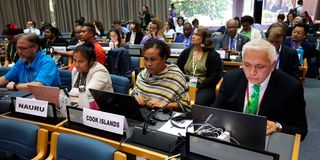Why Nairobi failed to give the world much awaited global plastics treaty

Delegates at the third session of the Intergovernmental Negotiating Committee (INC-3) to develop a treaty on plastic pollution at Unep headquarters in Nairobi on November 20,2023.
Negotiations seeking to deliver the first global plastics treaty ended on Sunday with no solid plan, rippled by oil-producing countries and major plastic manufacturers.
Endless disagreements over the wording and punctuation of some key sections of the zero-draft took centre stage during the third session of the Intergovernmental Negotiating Committee (INC-3) with major oil-producing countries, led by Saudi Arabia, Iran and Russia, determined to make it impossible for the world to birth the plastics treaty.
“The proposal to delete certain important elements is weakening the treaty and our urgency to tackle plastic pollution,” the Youth Coalition protested.
The oil-producing countries and major plastic producers like the United States ganged up and insisted that the revised draft text must give emphasis to plastic recycling and reuse. Kenya, Canada and the European Union insisted on limiting plastic pollution.
A day before the final day of the negotiations, Saudi Arabia, one of the biggest sellers of polymers in the world, had threatened to withdraw from the talks after it rejected any ambitious language in the text.
“Saudi Arabia put brackets [request to delete] on polymer, single-use, production and chemical,” INC-3 chair Gustavo Meza-Cuadra said, while further pointing out that Iran had “put more brackets than words on single-use”. “China also wants almost everything deleted and is just adding brackets.”
Deliberations over what is to be added or redacted from the zero-draft were so heated that Russia and the US, which usually do not see eye to eye, agreed in a bid to safeguard their interests.
The Nation also noted that while lobby groups were busy calling for a plastics treaty that addresses threats by chemicals in plastic material, representatives of the American Chemistry Council were pushing back after spending the better part of the day talking to governments over the sections of the draft they felt did not align to America’s interests.
The global meeting, which sought to develop an international legally binding instrument, did not make tangible headway after six days of intense negotiations. The Nation spoke to 10 of the lobbyists and established that about 100 of them had been dispatched to “talk to governments” and establish a counter-narrative that would advance their interests.
As late as 10pm on Sunday, delegates were still debating at the United Nations Environment Programme (Unep) headquarters, Nairobi, although the closing plenary had been scheduled for 2pm.
In an interview, Ayub Macharia, the director in charge of enforcement at the National Environmental Management Authority and Kenya’s head of delegation at the negotiations said that Kenya’s main demand was to make those who manufacture plastics and polluters to pay for the pollution.
“For too long, ambitious countries have failed to face up to the reality that a meaningful treaty on plastic pollution cannot be achieved as long as the least-ambitious countries are allowed to control the pace of the process,” said Magnus Løvol , a global treaty and international law expert from Switzerland.
“The week’s proceedings have swept away all doubt that some of the countries involved in this process—notably Iran, Saudi Arabia and Russia—are negotiating in bad faith. It is impossible to develop a treaty on plastic pollution in such circumstances.”
INC-4 and INC-5 are slated for April and November 25-December 1, next year in Ottawa, Canada, and Busan, South Korea, respectively.





